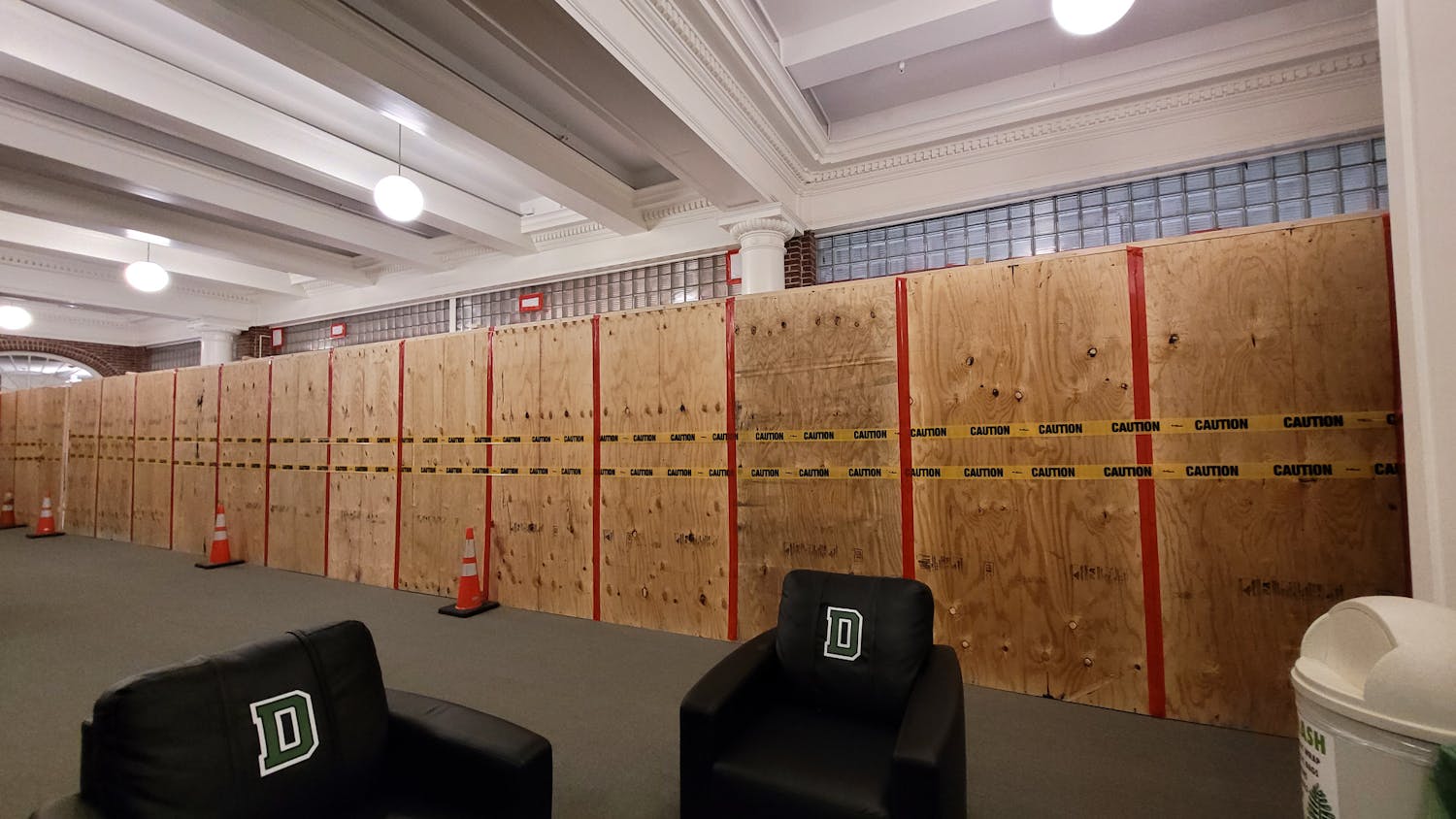Ever wonder how the students sitting in the galleries of the Hopkins Center for the Arts or the students behind the ticket counter got their jobs? The Hop presents a number of opportunities for students to find work on campus in positions such as ushers, gallery attendants, production assistants, ticket sellers and stage managers. These jobs not only provide students with compensation but can also lead one to great insider experiences with the arts at Dartmouth.
Cady Whicker ’17 works as a building monitor and a house manager at the Hop. Her tasks vary, from sitting at the information desk to event planning for the various productions the College puts on. She started working at the Hop during her junior year after working for the previous two years in a lab.
“[The lab] is a good part-time job, but it was also very draining to be held up in a lab and never see the light of the day,” Whicker said. “So I applied [to the Hop]. I really like interacting with people more and to be sort of closer to what’s happening here on campus.”
For Whicker, one of the main advantages of working at the Hop is the exposure to different forms of art.
“If you work for events, you can come to any show and watch it,” Whicker said. “I definitely got to see a bunch of those movies, which is awesome. Because a lot of them are foreign, they won’t be released to regular theater.”
Arthur Mensah ’19, who works at the box office ticket counter, agreed that Hop employment can promote one’s connection to arts events on campus. Last spring term, Mensah had the opportunity to meet one of his favorite artists, Angélique Kidjo, through an event at the Hop.
“It’s cool being connected to someone you have been listening to for a while,” he said. “It is a surreal moment.”
Mensah appreciates working at the box office because it connects him to the “non-academic side of Dartmouth.”
“I think working there is a reminder of all the cool things that Dartmouth has to offer outside of classes,” Mensah said.
Jo Cormier ’17, who works as an usher at the Hop, was first drawn to the job because she performed in arts-related activities during high school and was excited by the prospect of getting paid while being involved in theater. During the show, only a few of the ushers have to be in specific positions, so the remaining ones have the flexibility to watch the show or do homework outside, Cormier said.
“That’s partly why I took the job,” Cormier said. “I was going to be at these things anyway, so if I could get paid to be at them, it’s perfect.”
She noted that there are a lot of opportunities for Hop employees to get tickets to performances, whether it be special events or films, such as “Hamilton’s America.”
Nico Turk ’19 works as an attendant at the Strauss Gallery, serving as the first line of communication for visitors wanting to learn more about the exhibit.
“It’s usually basic questions like who’s the artist, what’s the purpose of the project,” Turk said. “It’s our responsibility to learn those things and be able to talk about them.”
The attendants also check on the art periodically to ensure that no one touches the work. Other responsibilities include cleaning the windows, tracking the number of entrants and managing the notebook where visitors can record their thoughts.
Students usually go through training prior to starting their jobs. For example, at the beginning of fall term, there is a general orientation for all stage-related positions. Prospective employees learn how to safely move and lift heavy objects, position their bodies and deal with cables, among other tasks.
“It’s sort of a broad overview,” Sarah Westney, production office business coordinator said.
Afterward, the applicants receive more specialized training. For positions working with sound and lighting, students have the chance to work one-on-one with professional staff members. Cormier stated that for the ushers, the first few shifts consist of on-the-job training with more seasoned employees.
Students interested in these jobs continue to gain knowledge and can access resources after the initial training, no matter what department they are working in. Steffen Eriksen ’17, a student gallery manager, believes the entire process of being a gallery attendant is a learning experience.
“At the opening of each exhibition, there is a lecture that is given by the studio art department, and I ask all the attendants to attend the lecture,” Eriksen said. “They can meet the artist. They can understand what art is on display and the broader narrative behind that exhibition.”
Eriksen noted that it is a “fantastic opportunity” for students to meet the artists and to better understand the art that they are monitoring.
Some jobs are more popular than others. The gallery attendant position is one of the most popular, in part because it pays well and gives students time to do their homework.
“It’s a prime job for a number of reasons,” Eriksen said. “You get to sit in a really interesting space and admire all the articles around you.”
Turk said that because of the popularity of some of the jobs, it can be difficult to get a spot. One of his tips was to meet the right people.
“Just hang out around the art gallery and be persistent if you want this job,” Turk said. “Ask the attendant and see if they can figure something out.”
Westney said that for some positions, there is no formal interview process. Applicants are asked about their prior experience, but the process is less intensive because of the thorough training that student employees go through. Cormier said that when she applied for the usher position, she merely sent in her résumé to get the position.
“We will basically accept any students who are willing to arrive on time, be professional and show interest,” Westney said.
He also noted that the Hop attempts to place students in positions that they are specifically interested in.
“If there is a particular area that they want to specialize in, we can focus on their training on that area,” Westney said.
Cormier said that there is a sense of community among the Hop employees.
“A lot of my really good friends have come from people that I’ve worked with at the Hop,” Cormier said.
Eriksen is a former news reporter for The Dartmouth.



